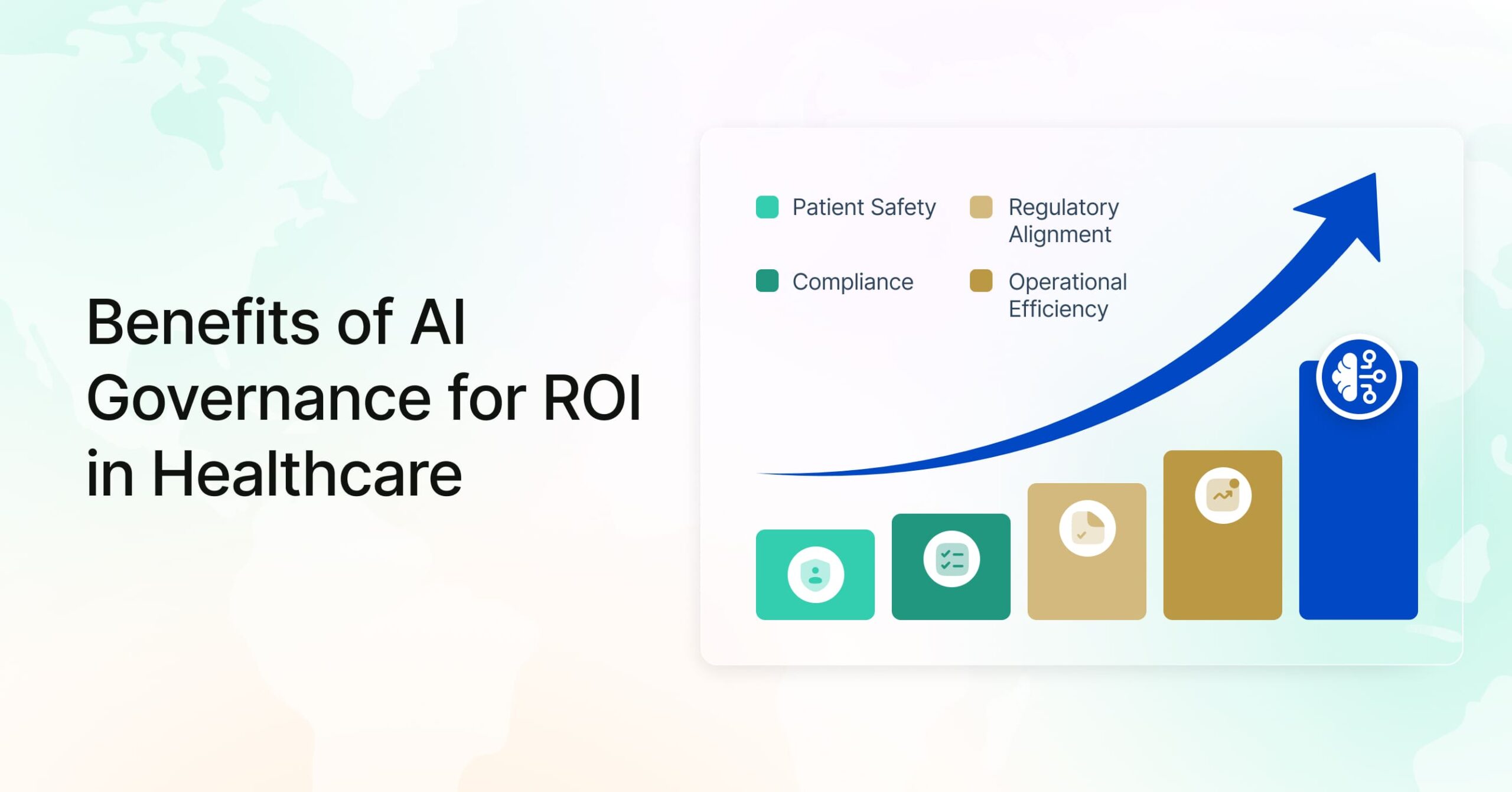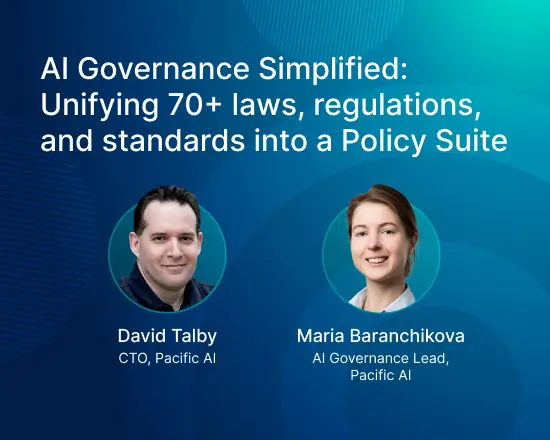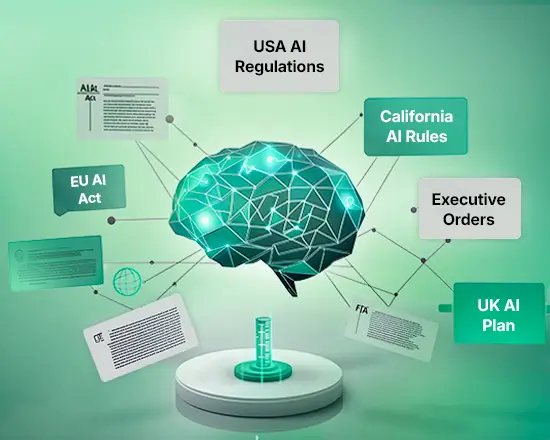Artificial Intelligence is rapidly transforming the healthcare sector, revolutionizing diagnostics, streamlining clinical workflows, enhancing patient engagement, and optimizing administrative tasks. But alongside this transformation comes the growing imperative to govern AI systems with transparency, safety, and compliance in mind. In healthcare, where the stakes involve human lives, protected data, and institutional credibility, the value of AI governance cannot be overstated. It is not merely a regulatory formality; it is a foundational pillar for operational integrity, clinical trust, and long-term innovation.
This article explores how governance adds tangible value to healthcare organizations through patient safety, regulatory alignment, operational efficiency, and strategic advantage. Drawing on Pacific AI’s experience and tools, including our recently updated (June 2025) AI Policy Suite, institutions can evaluate and maximize their ROI in governance frameworks.
Why Measuring ROI in AI Governance Matters

Healthcare leaders today operate in a landscape shaped by constrained budgets, competitive pressures, and heightened regulatory oversight. Every investment, from infrastructure to innovation, must be justified not only ethically, but also financially. AI governance often appears as an abstract layer of compliance, but its impact is concrete. Governance frameworks reduce the likelihood of adverse events, mitigate the financial and reputational cost of non-compliance, and enable healthcare organizations to adopt AI confidently.
From a strategic standpoint, governance provides clarity: which models are being used, by whom, under what controls, and for what purpose. By formalizing these boundaries, organizations create an environment where AI can flourish without triggering clinical, legal, or operational risks. This clarity ultimately converts into a measurable ROI reflected in reduced penalties, improved clinician adoption, faster audits, and fewer deployment delays.
The Financial and Operational Payoff of Strong AI Governance
The cost of poorly governed AI is increasingly quantifiable. Without structured oversight, AI models can generate hallucinated outputs, misdiagnose conditions, or trigger regulatory violations due to non-transparent decision-making. The resulting damages can include multimillion-dollar malpractice lawsuits, revoked licenses, prolonged investigations, and long-term reputational harm.
Conversely, AI governance enables smarter and faster decisions across the enterprise. Structured oversight accelerates the deployment of AI models by reducing the need for late-stage revisions. Policies aligned with legal standards eliminate guesswork for compliance teams. Monitoring tools catch model drift before it becomes a systemic issue.
Governance also lowers operational inefficiencies. Standardized controls reduce duplication of effort across departments. Centralized documentation supports faster responses to internal audits and external regulators. And consistent ethical frameworks minimize internal disagreements on AI usage, keeping teams focused on value creation rather than damage control.
Patient Safety: The Core Value Proposition
At the heart of healthcare is the mandate to do no harm. AI governance strengthens this mandate by ensuring models are continuously evaluated for accuracy, bias, and reliability before they reach the point of care. This is especially critical in the case of generative AI, which can produce confident yet incorrect outputs that could mislead clinicians or confuse patients.
A robust governance framework introduces human-in-the-loop oversight, traceability of decisions, and model validation protocols that function as safeguards. For example, an organization using AI to generate clinical documentation can apply Pacific AI’s AI Policy Suite to ensure outputs are reviewed by qualified professionals before they are integrated into electronic health records. This not only reduces liability, but also fosters greater trust in AI-assisted workflows.
Compliance as a Strategic Advantage
Too often, compliance is viewed as a defensive posture. But in the context of AI, compliance becomes a proactive, strategic advantage. Regulatory agencies across the globe, including the FDA, European Commission, and local health authorities, are developing increasingly nuanced frameworks for AI in healthcare. These include transparency mandates, explainability requirements, and documentation of clinical performance.
Pacific AI’s AI Policy Suite is designed to unify over 100+ of these frameworks, from HIPAA and GDPR to the CHAI Assurance Guide and WHO Ethics Guidelines, into a single, actionable system. Organizations that adopt this suite reduce audit preparation time, streamline legal reviews, and position themselves as leaders in responsible AI innovation.
Real-World Metrics That Define Governance ROI
AI governance ROI isn’t speculative. It can be tracked and quantified through clear KPIs such as:
- Reduction in AI-induced adverse events
- Percentage improvement in regulatory audit scores
- Speed of AI model deployment post-governance integration
- Increased adoption and trust by clinicians
- Legal costs saved due to fewer compliance breaches
Building Long-Term Value Through Governance Infrastructure
AI governance is not a one-time checklist, it’s an evolving system that grows alongside your AI maturity. As health organizations expand their AI footprint, across imaging, documentation, diagnostics, and patient engagement, governance becomes the infrastructure that ensures scale does not compromise safety, compliance, or trust.
Pacific AI is committed to helping healthcare organizations operationalize this vision. We provide not only policies, but also the tools and support to keep governance adaptive, actionable, and aligned with emerging global norms. For organizations that are serious about leveraging AI while safeguarding their mission, governance is the differentiator that enables speed, confidence, and credibility.
Transforming Governance into Strategic Infrastructure
If your organization is ready to move from ad-hoc controls to enterprise-grade governance, Pacific AI can help. Start by downloading our AI Policy Suite, which provides plug-and-play templates that align with over 100+ AI-related laws, regulations, ethics frameworks, and compliance guidelines.
From there, build a scalable and responsible AI strategy with our expert support. Our team helps healthcare leaders assess gaps, implement audit-ready practices, and future-proof their AI operations.
Book a consultation today to begin building the governance infrastructure that turns AI into a responsible, strategic advantage.
FAQ
How can AI governance improve patient safety outcomes?
Strong AI governance ensures traceability, peer review, and evidence-based validation of AI recommendations, reducing clinical errors and fostering safer decision-making.
What types of ROI metrics do healthcare organizations use for AI governance?
Organizations often measure reductions in audit findings, incident rates, model reworks, legal fines, and also track efficiency gains like faster deployment and improved compliance processes.
How does executive oversight contribute to governance ROI?
Involving executive sponsors ensures alignment with strategic objectives, secures resources, and speeds deployment, leading to stronger ROI by preventing delays and cost overruns.
Can governance frameworks increase adoption of clinical AI tools?
Yes. ROI-focused frameworks that assess vendor AI systems for alignment, risk, and value drive faster, safer adoption—with measurable benefits in efficiency and patient care.
Why link governance to strategic performance metrics beyond cost?
Modern ROI measurement goes beyond cost savings to include employee satisfaction, trust building, regulatory readiness, and time-to-market—making governance a strategic enabler.






